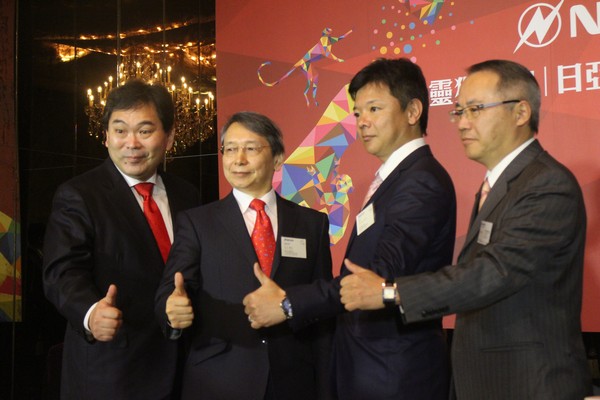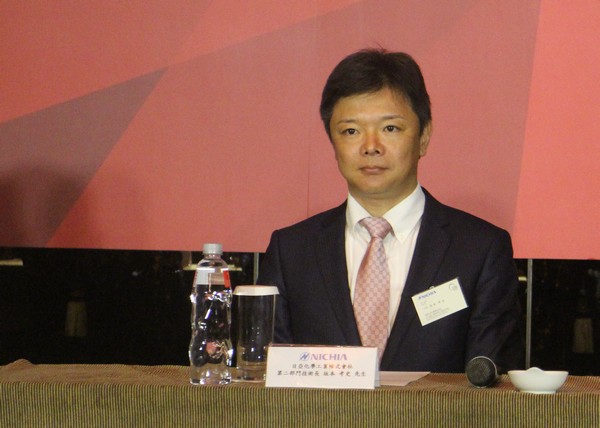Leading Japanese LED manufacturer Nichia spoke to Taiwanese reporters about technologies it will be focusing on this year, and about its outlook for 2016, during a press conference held at Palais de Chine Hotel in Taipei, Taiwan on Thursday.
Despite the very challenging market environment in 2015, Nichia was able to secure a revenue of about 295 billion Japanese Yen (US $2.62 billion) last year, said the company’s Taiwan office spokesman Hiroshi Watanabe. “We expect to keep profits at around the same level as last year at 20% in 2016, and estimate revenues to grow 11% to reach 330 billion Japanese Yen,” added Katsuyuki Akutagawa, Chief Legal & IP Officer and Company Board Director.
Regarding its LED chip technology progress, Nichia’sDirect Mounting Chip (DMC), a package-free LED unveiled last March is also being successfully manufactured and shipped to clients, said Takashi Sakamoto, the company’s Principal Technical Officer of Optoelectronics Products. “The company’s technology focus this year will be applying DMC and flip chips into automotive exterior lighting, UV LEDs, and laser diodes,” he added.
 |
|
Left to right: Hinori Takagi, General Manager, Intellecutal Property Department, Legal and Intellectual Property Dept., Legal & Intellectual property Division Administration Unit, Nichia, Katsuyuki Akutagawa, Chief Legal & IP Officer and Company Board Director of Nichia, Takashi Sakamoto, Principal Technical Officer, Optoelectronics Products The BU, Nichia, Hiroshi Watanabe, Spokesman for Nichia in Taiwan. (All photos courtesy of LEDinside) |
Nichia scales up R&D investments in UV LED
The dwindling LED backlight market in 2015 has spurred many LED manufacturers to seek alternative revenue sources from niche market applications, and restructure R&D resources. Nichia’s product development blueprint will be highlighting UV LEDs this year, which it plans to mass produce within three years. “The company Chair Eiji Ogawa approved increasing R&D investments in UV LED, during a recent board meeting,” said Sakamoto.
He projected the UV LED market would grow rapidly in 2016, due to emerging applications in the field that are extending from printers, exposurers and curing applications to home appliances. Sakamoto specifically highlighted the air purifier market would hold great potential for UV LED developments.
The company’s total R&D investments is projected to reach more than 30 billion Japanese Yen this year, with most of the funds channeled to new LED technologies under development, said Sakamato. Other innovative LED technologies in progress include laser diode, Direct Mounting Chip (DCP), Driver on Board (DOB) and 0.3t LEDs for smartphone backlight applications that all require large R&D investments.
 |
|
Left to right: Hinori Takagi, General Manager, Intellecutal Property Department, Legal and Intellectual Property Dept., Legal & Intellectual property Division Administration Unit, Nichia, Katsuyuki Akutagawa, Chief Legal & IP Officer and Company Board Director of Nichia, Takashi Sakamoto, Principal Technical Officer, Optoelectronics Products The BU, Nichia, Hiroshi Watanabe, Spokesman for Nichia in Taiwan. |
Nichia’s outlook for laser diodes and automotive lighting
LED headlights make up a small fraction of the automotive lighting market, but with new car models adopting the lighting technology, the market is expected to grow rapidly in the next few years, commented Sakamoto. Laser diodes will become more common in automotive headlight designs in the near future, due to its higher intensity brightness and longer illumination distance compared to LEDs, he added.
In terms of overall laser diode technology developments, the technology has evolved from the industrial industry to consumer electronics in 2015, said Sakamoto. Lasers projectors are a prime example of this shifting paradigm, the high efficiency light source has enabled downsizing of projectors, and driving it at higher electric currents.
“Nichia intends to move beyond red, blue and green laser to develop white light emitting lasers”, said Akutagawa. “We have a comprehensive white light laser patent portfolio.” Having developed laser technology for the last 20 years, the company’s laser products follow international standards to reduce potential hazards the high energy light source could cause to the naked eye, said Sakamoto.
 |
|
Takashi Sakamoto, Principal Technical Officer, Optoelectronics Products The BU, Nichia. |
Sakamoto: OLED won’t take over backlight market anytime soon
It is not an industry secret that the LED backlight market demands has dropped over the past year. “The LED backlight market growth will remain stagnant in 2016, and the market sector’s total revenue might even decrease 30%,” said Sakamoto. With brighter and more efficient LEDs driving down usage volume in monitors, smartphones, and notebook panels and screens, the market outlook does not look too bright.
Aggravating LED backlight market situation, is the rise of OLED screened devices. Market rumors pointing that Apple will be switching to this technology soon in next generation iPhones and electronic devices, has raised the question of whether OLED is ready to replace LEDs as the new backlight solution.
Responding to this pressing issue, Sakamoto commented: “I don’t think OLEDs will completely replace LEDs in high-end smartphone display backlight applications. The impact of switching from LED to OLED will be low, and it could be possible that smartphone vendors will use both backlight technologies.”
Disruptive display technologies built on the foundation of LEDs could prevent OLED from becoming a mainstream backlight technology. In his opinion, mico LEDs is a technology capable of replacing OLEDs. Moreover, OLED still needs to overcome reliability and mass production issues, he added.
“I think the rise of OLED is actually a good development for the LED industry,” said Sakamoto. “It will push consumers to ask for higher quality monitors with better quality LEDs, which would propel the LED backlight industry towards high-end markets. LED vendors without the technology capacity will eventually withdraw from the market.”
Nichia is carving out a path in UV LEDs, laser diodes, automotive lighting and other technologies to weather the rough market conditions in the backlight sector. To achieve its goal, the company is investing massively in the development of these products, and intends to emerge as a leader in these new lighting technologies.
(Author: Judy Lin, Chief Editor, LEDinside)














